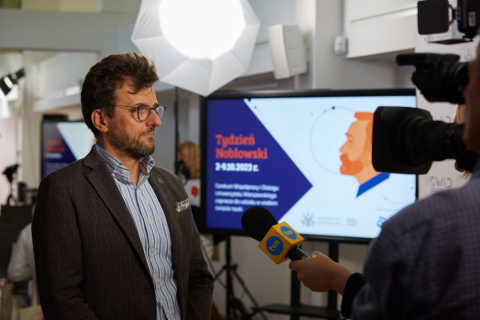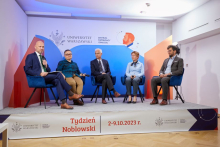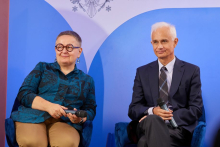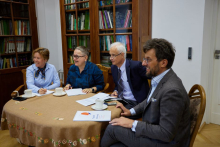The Novel Assembly published its decision on October 2. The explanatory memorandum stated that the practical implementation of the Nobel Laureates’ findings has saved millions of lives and prevented severe disease in many more.
Who are the Laureates
Katalin Kariko is a Hungarian biochemist working in the United States, and Drew Weissman is a U.S. immunologist. They met in 1997 at The University of Pennsylvania. They started their research on mRNA technology by the end of the 1990s and made their breakthrough discovery in 2005. It had never happened before that a new technology would be awarded by the Nobel Assembly in such a short time after development.
Meeting of experts
The award of the Nobel Prize in Physiology or Medicine was an opportunity for a meeting of experts who commented on the decision of the Nobel Assembly in the course of the Nobel Week. Our University was represented by prof. Rafał Płoski, head of the Medical Genetics Department at the Faculty of Medicine, and prof. Paweł Włodarski, head of the Research Methodology Department of the Faculty of Medicine.
The Warsaw University was represented by prof. Maria Anna Ciemerych-Litwinienko of the Institute of Development Biology and Biomedical Sciences, Faculty of Biology, and prof. Katarzyna Tońska of the Institute of Genetics and Biotechnology, Faculty of Biology.
The essence of the discovery
The experts explained this years Nobel Laureates’ discovery.
– mRNA, and RNA in general are relatively unstable molecules – prof. Tońska said – and therefore it would be difficult to produce such a quantity of protein on their basis that would be capable of triggering an immune reaction in the body. This year’s Nobel Prize was awarded, among other things, for successfully stabilizing that molecule, applying it to the body and making it generate a response, for example by immunizing us to some kind of virus - the Warsaw University expert explained.
Prof. Rafał Płoski noted that the Nobel Laureates’ findings appeared concurrently with technological advancements that allow for fast, inexpensive and good sequencing of mRNA. Otherwise, the discovery would be harder to use in practice. – I think we are now facing the process of vaccine printing – the professor said – meaning that just a few days or weeks will pass from the point at which a hazard, such as a virus, is identified to actual vaccine production. This is a real breakthrough.
Possible applications
Prof. Włodarski noted that this year’s Nobel Prize was not awarded for the vaccine but for the mRNA modification technology used in the production of vaccines. – Among the numerous possible applications of this technology, there is cancer treatment, too. At our University, prof. Jakub Gołąb, in collaboration with prof. Jacek Jemielity from the Warsaw University, are working right now on the applications of a similarly modified RNA in oncology.
The experts’ Nobel Week discussion took place at the Warsaw University, with Jacek Sztolcman as facilitator.



